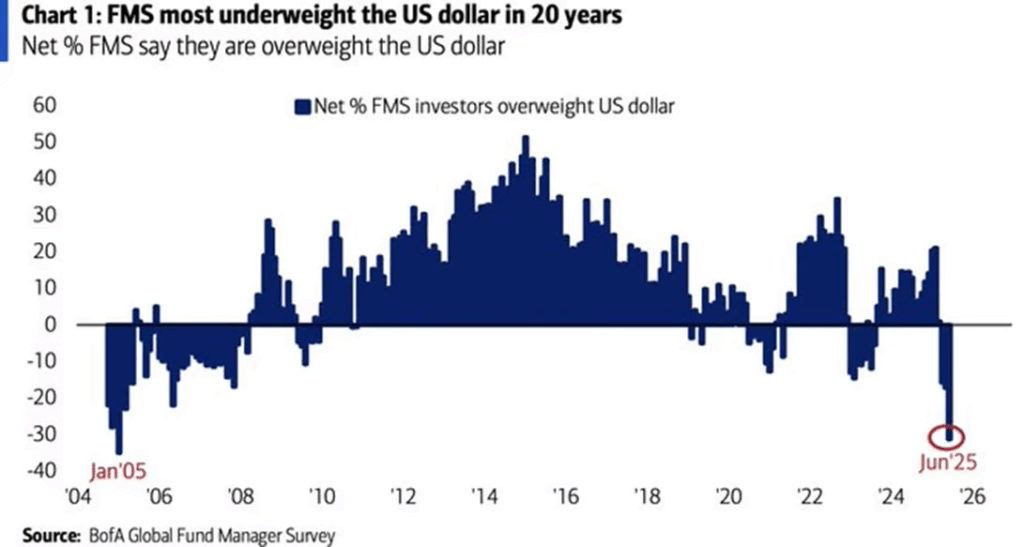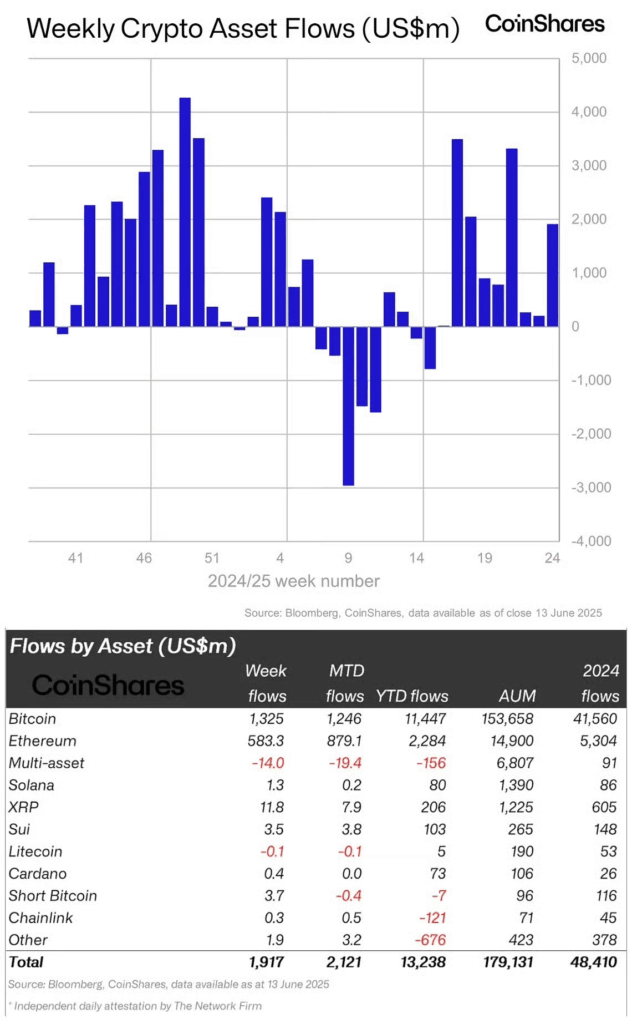1. Watch for Short-Term Bounce in Dollar…Too Many Bears

A Wealth of Common Sense
2. Consensus Weak Dollar and Majority Think International Stocks Outperform?

Bloomberg
3. S&P Sectors % Above 50day and P/E Valuation vs. 10-Year Average
Bespoke Investment Group Looking at sectors, Energy now has the highest percentage of stocks above their 50-day moving averages at 91.3%, and the Energy sector’s valuation relative to the last ten years is on the low side compared to the rest of the market. Financials and Technology currently have the highest valuations relative to readings over the last ten years.

Bespoke
4. Weekly Crypto Asset Flows
Crypto asset flows. “Digital asset investment products saw US$1.9bn in inflows last week, marking the 9th consecutive week and a record YTD total of US$13.2bn. Bitcoin rebounded with US$1.3bn in inflows, while Ethereum saw US$583m inflows, its strongest since February.”

Paychart Books
5. Tether Reserves Breakdown

FinChart
6. JPMorgan moves further into crypto with stablecoin-like token JPMD
Key Points
- U.S. banking giant JPMorgan is launching its alternative to a stablecoin called JPMD.
- The new product is a so-called deposit token that’s designed to serve as a digital representation of commercial bank money.
- JPMorgan said the benefit of launching a deposit token over a stablecoin is the close connection with traditional banking systems.
Via CNBC: JPMorgan Chase is taking a step further into the cryptocurrency space with its own stablecoin-like token, called JPMD.
The U.S. banking giant told CNBC on Tuesday that it’s planning to launch a so-called deposit token on Coinbase’s public blockchain Base, which is built on top of the Ethereum network. Each deposit token is meant to serve as a digital representation of a commercial bank deposit.
JPMD will offer clients round-the-clock settlement as well as the ability to pay interest to holders. It is a so-called “permissioned token,” meaning it is only available to JPMorgan’s institutional clients — unlike many stablecoins, which are publicly available.
“We see institutions using JPMD for onchain digital asset settlement solutions as well as for making cross-border business-to-business transactions,” Naveen Mallela, global co-head of Kinexys, J.P. Morgan’s blockchain unit, told CNBC Tuesday.
“Given the fact that deposit tokens would eventually be interest bearing as well, this would provide better fungibility with existing deposit products that institutions currently use,” he added.
7. High Yield Bond ETF New Highs

StockCharts
8. Home Inventory Increasing and Number of Owners Planning to Sell in Next 6 Months

Joe notes that we haven’t seen inventory build up anything like this since the GFC. And outside that, nothing else in the last 40 years.

Dave Lutz Jones Trading
The JPM survey sees a jump in homeowners planning to sell in the next ~6 months.
9. Metros with Home Prices Going Negative
The growing list of year-over-year price declines-Wolf Street.
In May, the list of year-over-year decliners got a new member, Seattle. In total, of the 33 MSAs here, 18 show year-over-year declines, up from 6 at the end of 2024. In all of those 18 metros, the year-over-year declines worsened.
Year-over-year declines in May:
- Austin: -5.5%
- Tampa: -5.5%
- Dallas: -3.4%
- Phoenix: -3.4%
- San Antonio: -3.3%
- Orlando: -3.2%
- Miami: -3.2%
- Atlanta: -2.7%
- San Francisco: -2.5%
- Denver: -2.4%
- San Diego: -1.9%
- Raleigh: -1.8%
- Honolulu: -1.7%
- Houston: -1.5%
- Sacramento: -1.4%
- Charlotte: -0.9%
- Portland: -0.5%
- Seattle: -0.1% (newest addition)
10. Your Morning Coffee Can Help You Live Longer — As Long As It’s This Type Of Brew
Coffee carries life-lengthening health benefits, but not if you’re adding flavors and creams to it.
In a nutshell:
- Coffee drinkers who consumed 1-3 cups daily had a 15-17% lower risk of dying early compared to non-coffee drinkers
- Health benefits only applied to black coffee or coffee with minimal added sugar (less than half a teaspoon per cup) and saturated fat
- Coffee drinks high in sugar and saturated fat showed no protective effects, potentially eliminating coffee’s health benefits entirely
Via Study Finds: Americans love their coffee, with about half of us reaching for a cup every single day. And here’s some news that might make your morning brew taste even better: that daily coffee habit could be cutting your risk of dying early by up to 17% — but there’s a catch that could cancel out the benefits.
A study tracking nearly 50,000 American adults for more than a decade found that coffee drinkers lived longer than those who skipped their daily caffeine fix. The twist? The life-extending benefits were only seen in people who drank black coffee or coffee with very little added sugar and saturated fat. Those sugary, creamy coffee shop drinks? They offered no measurable health advantage.
According to the study, coffee with higher levels of added sugar and saturated fat was not associated with lower death rates. Moreover, the benefits were not seen in people who preferred a decaf brew. The research took a detailed look at what Americans are actually putting in their coffee, and the findings raise red flags about our sweetened coffee culture.
Nearly 50,000 Americans Tracked for Over a Decade
Researchers from Tufts University analyzed coffee drinking habits and health outcomes in 46,322 adults aged 20 and older who participated in U.S. government health surveys between 1999 and 2018. Participants were followed for roughly 9 to 11 years, with actual mortality outcomes tracked using National Death Index records.
During that time, 7,074 participants died — 1,176 from cancer and 1,089 from cardiovascular disease. Compared to non-coffee drinkers, those who drank coffee had significantly lower mortality rates. The greatest benefit appeared in people drinking 2 to 3 cups a day, who had a 17% lower risk of dying during the follow-up period. Even those who drank less than a cup a day saw an 11% lower risk.
Why Sweetened Coffee May Cancel the Health Benefits
The researchers also examined what went into those cups of coffee. Each beverage was classified based on how much added sugar and saturated fat it contained per 8-ounce serving.
Drinking black coffee was associated with a 14% lower risk of all-cause mortality. Coffee with small amounts of added sugar (under 2.5 grams per cup) and saturated fat (under 1 gram per cup) also showed the same 14% reduction.
But for people drinking coffee with higher amounts of sugar and saturated fat, there was no statistically significant reduction in risk of death. For context, the average U.S. coffee drink contains 3.24 grams of added sugar and 0.52 grams of saturated fat per 8-ounce cup, suggesting that many Americans are overshooting the threshold where coffee may offer health benefits.
Caffeine Key to Longevity
The study, published in The Journal of Nutrition, also found that caffeinated coffee — not decaf — was driving most of the observed health benefits. While decaffeinated coffee showed no clear association with longevity, caffeinated coffee was linked to reduced risk of death from both all causes and cardiovascular disease.
That’s in line with previous research suggesting that caffeine may play a protective role by boosting metabolism, reducing inflammation, and improving insulin sensitivity. Coffee also contains other bioactive compounds like chlorogenic acid and polyphenols that are thought to have antioxidant and anti-inflammatory effects.
Interestingly, the protective effects of coffee were only observed among people who did not drink tea. Among tea drinkers, the association between coffee and longevity disappeared, though the study doesn’t explain why.
It’s Best To Be Basic
For the estimated 150 million Americans who drink coffee daily, this study delivers both a bit of good news and a wake-up call. The good news: your coffee habit could be helping you live longer. The reality check: if your go-to drink includes lots of sugar, cream, or flavored syrups, those potential benefits may be lost.
Researchers adjusted for a wide range of lifestyle and health variables, including age, sex, race, income, smoking, alcohol use, exercise, diet quality, and preexisting conditions. Even then, the association between simple coffee and lower mortality still held up.
The takeaway? A basic cup of coffee, especially when consumed black or lightly sweetened, may be one of the healthiest parts of your day. But when that cup starts to resemble dessert and doesn’t have caffeine, the health perks may disappear.